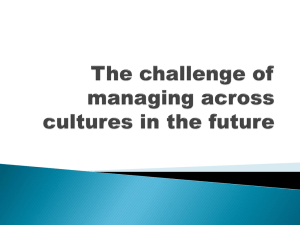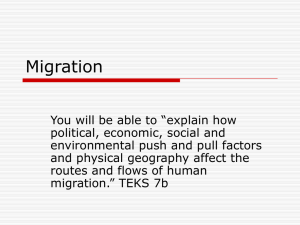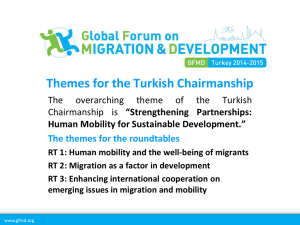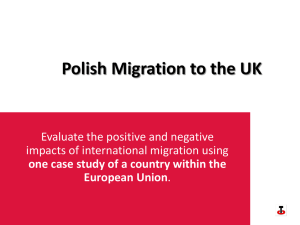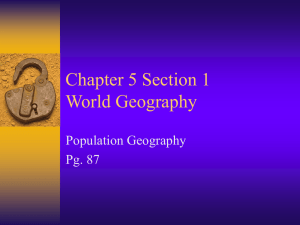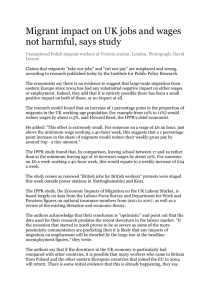Reconfiguring borders and mobility in times of crisis
advertisement
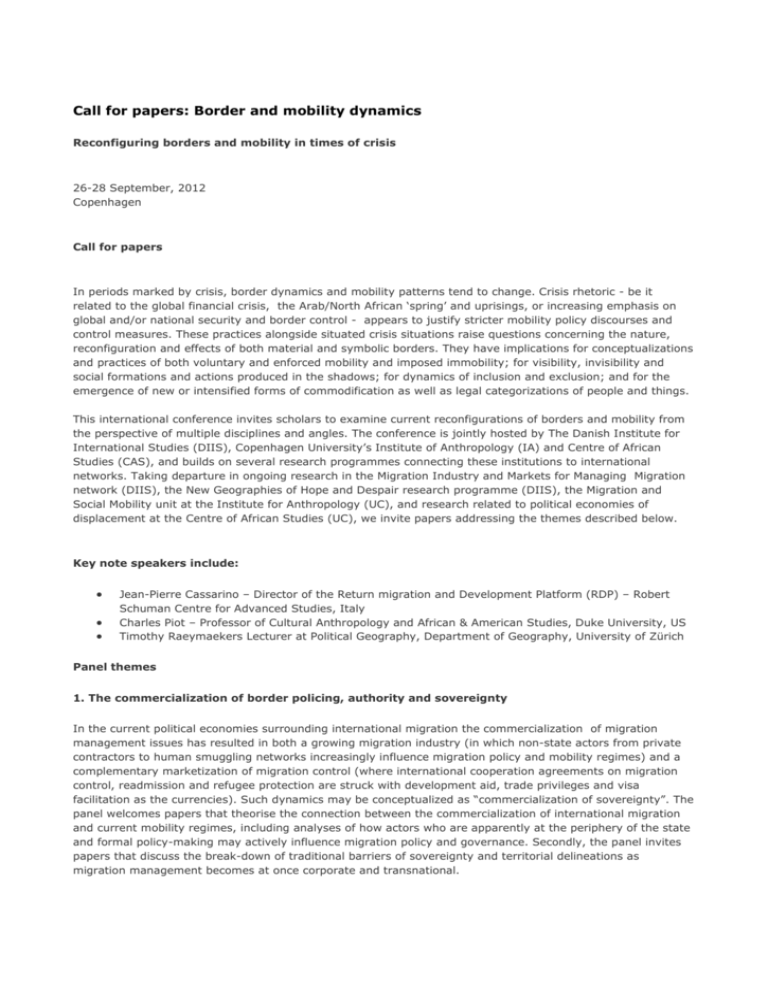
Call for papers: Border and mobility dynamics Reconfiguring borders and mobility in times of crisis 26-28 September, 2012 Copenhagen Call for papers In periods marked by crisis, border dynamics and mobility patterns tend to change. Crisis rhetoric - be it related to the global financial crisis, the Arab/North African ‘spring’ and uprisings, or increasing emphasis on global and/or national security and border control - appears to justify stricter mobility policy discourses and control measures. These practices alongside situated crisis situations raise questions concerning the nature, reconfiguration and effects of both material and symbolic borders. They have implications for conceptualizations and practices of both voluntary and enforced mobility and imposed immobility; for visibility, invisibility and social formations and actions produced in the shadows; for dynamics of inclusion and exclusion; and for the emergence of new or intensified forms of commodification as well as legal categorizations of people and things. This international conference invites scholars to examine current reconfigurations of borders and mobility from the perspective of multiple disciplines and angles. The conference is jointly hosted by The Danish Institute for International Studies (DIIS), Copenhagen University’s Institute of Anthropology (IA) and Centre of African Studies (CAS), and builds on several research programmes connecting these institutions to international networks. Taking departure in ongoing research in the Migration Industry and Markets for Managing Migration network (DIIS), the New Geographies of Hope and Despair research programme (DIIS), the Migration and Social Mobility unit at the Institute for Anthropology (UC), and research related to political economies of displacement at the Centre of African Studies (UC), we invite papers addressing the themes described below. Key note speakers include: Jean-Pierre Cassarino – Director of the Return migration and Development Platform (RDP) – Robert Schuman Centre for Advanced Studies, Italy Charles Piot – Professor of Cultural Anthropology and African & American Studies, Duke University, US Timothy Raeymaekers Lecturer at Political Geography, Department of Geography, University of Zürich Panel themes 1. The commercialization of border policing, authority and sovereignty In the current political economies surrounding international migration the commercialization of migration management issues has resulted in both a growing migration industry (in which non-state actors from private contractors to human smuggling networks increasingly influence migration policy and mobility regimes) and a complementary marketization of migration control (where international cooperation agreements on migration control, readmission and refugee protection are struck with development aid, trade privileges and visa facilitation as the currencies). Such dynamics may be conceptualized as “commercialization of sovereignty”. The panel welcomes papers that theorise the connection between the commercialization of international migration and current mobility regimes, including analyses of how actors who are apparently at the periphery of the state and formal policy-making may actively influence migration policy and governance. Secondly, the panel invites papers that discuss the break-down of traditional barriers of sovereignty and territorial delineations as migration management becomes at once corporate and transnational. The panel is organized by the “Migration Industry and Markets for Managing Migration” research network. Contact Matilde Skov Danstrøm: msd@diis.dk (on behalf of Ninna Nyberg Sørensen andThomas GammeltoftHansen). 2. Rerouting migration: connections and disconnections In recent years a reconfiguration of mobility patterns from Africa to Europe has taken place. The enduring economic crisis in Africa since the 1980s at a time when more young people aspire to middle-class lifestyles and white collar work encourages a rerouting of migration from within the continent to destinations outside. At the same time, the EU is consolidating policy regimes with focus on migration management and the combat against irregular migration, often in collaboration with African states known as sending and transit countries. As a result, previously established migration routes towards Europe become more difficult and dangerous with increased border control and risk of deportation and detention, while new routes and destinations evolve. This conference theme explores these developments. It examines connections between political economies, migration policies and changed mobility patterns such as migrants getting ‘stuck’, detained or deported en route, ‘transit migration’ turning into settlement, and emerging new mobility patters. Furthermore, it analyses sentiments of connection and disconnection amongst migrants by exploring the effects of interrupted paths to hoped-for futures and the ways in which notions of hope, opportunities, risk and failure are reshaped among prospective, actual and deported migrants. The panel is organized by the New Geographies of Hope and Despair research programme. Contact Nauja Kleist: nkl@diis.dk 3. Reconfiguring Borders, Bodies and Economies in Times of Crisis In periods marked by crisis (event-related or more chronic), new forms of exclusion, dispossession and displacement occur on multiple levels. In such times, economies get reconfigured in both formal and informal or licit and illicit ways, with varied responses by different actors. This process includes, among other things, the emergence of new or intensified forms of commodification; the reshaping of markets and mechanisms of exchange; the creation both of new barriers to trade and of alternative (often illicit) trade routes; and the generation of new dynamics of accumulation and class formation. In such times, both physical-state borders and social-symbolic orders play key roles in defining or redefining the terms of deterioration or success of those affected, by contracting or expanding, deterring or facilitating, the possibilities for movement of bodies, money and things. This conference theme seeks to interrogate how these newly emerging economies and economic practices are being reconfigured in and across multiple, inter-related sites – both some of the world’s more marginalized and most privileged spaces – through the articulation of crisis and changing national/ international regimes of governance of movement and borders. The panel is organized by the Sovereignties and Citizenship Research Platform at the Centre of African Studies, Copenhagen University Contact Amanda Hammar : aha@teol.ku.dk 4. Invisible Lives. Ethnographic Illuminations of Undocumented Migration Due to their statutory illegality undocumented migrants are forced to live ‘invisible lives.’ They hide and reside in the shadow of a world that works against them, building their lives on the underbelly of our regular regimes of rights and recognition. Focusing on invisibility allows us to see the social manipulation of presence that underlies much migration: it attunes our perspective to how migrants are made invisible, by dominant social orders. How they become stripped of human characteristics (reduced to a number, a negative phenomenon, a threat), and, indeed, strip themselves of identity (discarding documents, changing their ages, names, nationalities). This conference theme, thus, looks at the experience and effect of living shadow lives, and focuses on the social formations and practices it produces. It calls for papers that provide a perspective from inside the illegal and illicit networks and connections that undocumented migrants develop, depend on and are caught up in. This panel is organized by the Migration and Social Mobility unit at the Institute of Anthropology. Contact Hans Lucht: Hans.Lucht@anthro.ku.dk or Henrik Vigh:hv@anthro.ku.dk The conference will be hosted by the Danish Institute for International Studies, Main Auditorium, Strandgade 72, 1401 Copenhagen K. www.diis.dk

